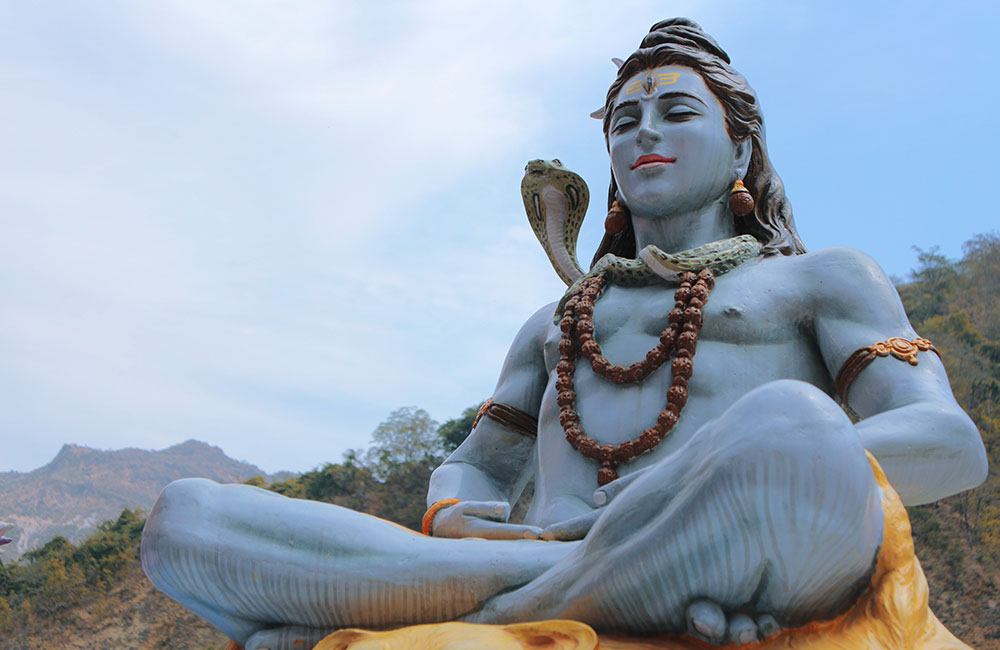
Tithi (Lunar day): Magha Krushna Paksha Chaturdashi (Fourteenth day in the dark fortnight of eleventh month in the Hindu lunar almanac).
Importance: On the day of Mahashivratri, Shivatattva (Deity Shiva’s Principle) is a thousand times more active compared to other days. To avail maximum spiritual benefit most from the Shivatattva on this day, chant ।। Om Namah Shivay ।। and worship Deity Shiva with bhav (Spiritual emotion).
Story about Shivaratri: There was a cruel hunter who was a great sinner. Once when he went to hunt, he came across a Shiva temple. Since it was the day of Mahashivratri, he saw many people performing worship devoutly, singing bhajans (Devotional songs), kirtans (Devotional discourses) etc. He made fun of them, saying that they were fools who consider a stone to be a God and chant ‘Shiva, Shiva’ and ‘Har Har’, and he proceeded to the jungle. He climbed a tree to look out for a prey; but the tree leaves blocked his vision. He began to pluck the leaves. At that time, he was chanting ‘Shiva, Shiva’. The leaves he plucked fell on a Shivapindi (Deity Shiva’s sacred symbol, which includes the shalunka) that was beneath the tree. At day break, he saw a deer. He was about to release a bow when the deer begged for its life. The deer also told the hunter what happens when a sin is committed, and went away. The tree was a bilva (Aegle marmelos) tree. Unknowingly, the hunter had remained awake through the night, had offered bel leaves to Shiva and chanted Shiva’s Name. All this destroyed his demerits and he obtained knowledge. This story indicates how Deity Shiva is pleased even with a worship performed unknowingly.
Types of Mahashivratri vrat - With expectation and incidental
Method of performing the vrat (Vowed religious observance): Fasting, worship and remaining awake the whole night are the three aspects of this vrat.
Ritual of the vrat - One should have only one meal (ekabhukt) on Magha Krushna Paksha Trayodashi (Thirteenth day in the dark fortnight of eleventh month in the Hindu lunar almanac). On the next day, that is, Chaturdashi morning, the sankalp (Resolve or intent) for the vrat should be made. In the evening, bathe in a river or a lake according to religious restrictions. Wear a rudraksha mala (A rosary made with rudraksha seeds) and apply bhasma (Holy ash). At the time of Pradosh, go to the temple of Deity Shiva, meditate, perform Shodashopchar-puja (Ritualistic worship involving sixteen specific substances) and offer water to Shiv-Parvati. Deity Shiva should be offered 108 lotuses or bel leaves, accompanied by chanting. Then Arghya (An oblation of water to God) should be given after offering flowers. After worship, recitation of verses and chanting of moolmantras (the primal mantra), the flower offered to Deity Shiva should be taken and kept on one’s head. Also one should ask pardon for the sins committed.
‘On the day of Mahashivratri, Shankar is also offered the mango blossoms.’ – Gurudev Dr Kateswamiji
On the eighth day of the dark fortnight of the Hindu lunar month of Jyeshtha, Deity Shiva and on the fourteenth day, Revati should be ritualistically worshipped with blue flowers. The tuft of Kevada plant should be offered to Deity Shiva during the udyapan (Ritual of concluding) of the vrat of Mahashivratri.
Yam (Deity of Death) puja - It is said that Deity Shiva should be worshipped four times in the four parts of the night of Mahashivratri. This is called Yam-puja. In every Yam-puja, God should be given a sabhayang snan (bath). Anulepan (applying scented paste) should be performed, also leaves of dhatura (Mexican poppy), mango and bel should be offered. Arti (A ritual of waving a lit lamp in front of a Deity, accompanied by singing of hymns) should be performed with 26 lit lamps, made from rice flour. At the end of the worship,108 lamps should be donated. Each worship has different mantras. Arghya should be given while reciting these mantras. Dancing, singing and listening to stories etc. should be done to remain awake through the night. At dawn, Deity Shiva should be worshipped again, after a bath. A meal should be offered to a Brahman to mark the end of the fast. After taking his blessings, the vrat should be concluded. Concluding ceremony should be performed after doing this vrat for twelve, fourteen or twenty four years.
Spiritual science - The substances of worship of Deities undergo changes according to time. For example, blue flowers should be offered to Shiva on the eighth day of the dark fortnight of the Hindu lunar month of Jyeshtha, as on that day blue colour has the ability to absorb the Shivatattva as much as the green bel leaves.